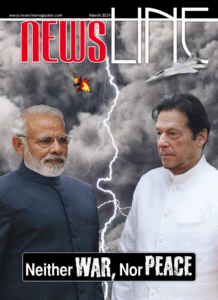Editor’s Note: March 2019
By Rehana Hakim | Editor's Note | Published 6 years ago
 Six months in the seat of power and Prime Minister Imran Khan faces the toughest challenge of his political career, as war clouds hover over the subcontinent.
Six months in the seat of power and Prime Minister Imran Khan faces the toughest challenge of his political career, as war clouds hover over the subcontinent.
After a stinging response by the Pakistan Air Force to the air strikes in Balakot by the Indian Air Force, which took down a few trees — not the 350 militants holed up in a Jaish-e-Mohammed (JeM) terrorist camp as per India’s claims, as verified even by an American satellite imaging company which identified a solitary and completely intact madrassa and a few equally intact homes in exactly that site — Indian Prime Minister Narendra Modi is seething with anger and the jingoistic Indian media has egg on their face. The downing of two aircraft and capture and gracious return of the IAF pilot has further punctured the nationalistic Indian ego. But the temporary lull following Squadron Leader Abhinandan’s return by Pakistan may not last long. Despite calls by the US and Europe to the two nuclear-armed neighbours to hold their fire, a red-faced Modi, with eyes set on the forthcoming elections, seems determined to exact revenge. There is a daily exchange of fire at the LoC, resulting in the deaths of soldiers and civilians. Most recently, the Pakistan Navy detected and blocked an Indian submarine from entering Pakistani waters.
So Pakistan is not out of the woods. Not yet. And given India’s size, and its economic clout, the international community tends to overlook its intransigence and trespasses. The indigenous freedom movement that is presently unfolding in the Kashmir Valley, is a case in point. Massive atrocities are being perpetrated on the youth in particular, who lead the movement now. Thousands of Kashmiris have been killed, maimed and blinded by pellet gun wounds, but the West turns a blind eye. As does the Muslim world. What was deeply disturbing for founding member Pakistan was the OIC’s invite to the Indian Foreign Minister as guest of honour at its annual meeting — despite pleas to revoke the invitation following the Balakot attack. India has continued to play the terrorism card against Pakistan successfully, as it did after the Pulwama attack. And the fact that the Pakistan-based JeM claimed the attack did not help. Groups like JeM and Lashkar-e-Tayyaba have been on the radar of the UN and the Financial Action Task Force for some time now. In fact, Pakistan is under threat of being moved from FATF’s grey list to its black list, if it does not freeze the funding sources of these militant groups.
In its latest move, the government has announced a massive crackdown against militant outfits, and in the first phase, taken 44 activists of proscribed organisations, including two relatives of the JeM chief, into protective custody.
The moot point is, will the government and security agencies show zero tolerance and see this crackdown to its bitter end? For in the past, militant outfits have resurfaced under different names and carried out cross-border attacks. Moreover, Pakistan itself has lost 55,000 civilians and soldiers to terrorism. So it is equally in our own interest to destroy this terrorist network. More so now, than ever, when India is threatening to use it as an excuse to strike us and trigger what could develop into a nuclear conflagration. With an extremist government at the helm in India, there exists a clear and present danger of war. And the voices of sanity and reason being raised in favour of peace across the border are being drowned out by the massive war hysteria. Incidentally, a PTI minister who attempted to whip up war frenzy and belittled the Hindu community in a speech in Lahore, was shown the door by the PM. A laudable move, indeed.
Have the warmongers not learnt any lessons from Hiroshima and Nagasaki, where an estimated 317,000 lost their lives from burns, radiation sickness and cancer? And this time the weapons of war — and the magnitude of the damage they could wreak — make those used in Japan seem like mere slingshots.
Rehana Hakim is one of the core team of journalists that helped start Newsline. She has been the editor-in-chief since 1996.
No more posts to load


